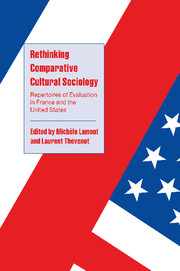Book contents
- Frontmatter
- Contents
- Notes on contributors
- Acknowledgements
- 1 Introduction: toward a renewed comparative cultural sociology
- Part I Race, gender, and multiculturalism
- Part II The cultural sphere: publishing, journalism, and the arts
- Part III Political cultures and practices
- Conclusion: Exploring the French and the American polity
- References
- Index
1 - Introduction: toward a renewed comparative cultural sociology
Published online by Cambridge University Press: 26 March 2010
- Frontmatter
- Contents
- Notes on contributors
- Acknowledgements
- 1 Introduction: toward a renewed comparative cultural sociology
- Part I Race, gender, and multiculturalism
- Part II The cultural sphere: publishing, journalism, and the arts
- Part III Political cultures and practices
- Conclusion: Exploring the French and the American polity
- References
- Index
Summary
This volume's first objective is to propose a theoretical approach for comparative cultural sociology to analyze national cultural differences while avoiding the traditional essentialist pitfalls of culturalism: in particular, we develop the concept of national cultural repertoires of evaluation to point to cultural tools that are unevenly available across situations and national contexts. Our second objective is empirical: we document the extent to which different criteria of evaluation are salient in the French and American national cultural repertoires and the rules that people follow in justifying their use. These criteria have to do with market performance, the defense of the public interest, human solidarity, morality, aesthetics, and so forth.
The analysis draws on eight case studies conducted by eleven French and American researchers who have worked together over a period of four years toward developing systematic comparisons. The cases bear on issues as varied as the value of contemporary art, what constitutes sexual harassment, the legitimacy of interests in environmental conflicts, and whether racial groups are morally equal. Most are “hot” areas generating intense passion or disagreement, which we study through participant observation. Alternatively, through interviews, we push actors involved in these hot areas to make explicit the criteria of evaluation they use when they confront others with whom they disagree.
The case studies were conducted either by a bi-national team of French and American researchers collaborating on all the phases of an integrated comparative research project, or by a single researcher responsible for fieldwork on each side of the Atlantic.
- Type
- Chapter
- Information
- Rethinking Comparative Cultural SociologyRepertoires of Evaluation in France and the United States, pp. 1 - 22Publisher: Cambridge University PressPrint publication year: 2000
- 66
- Cited by

